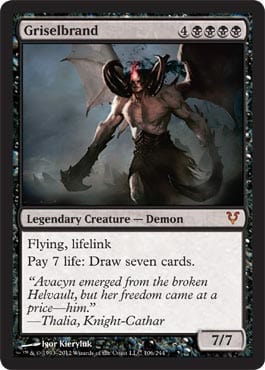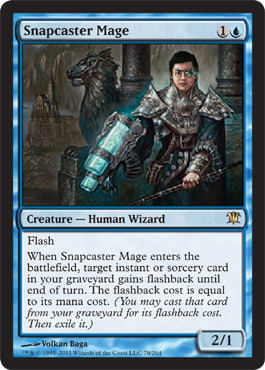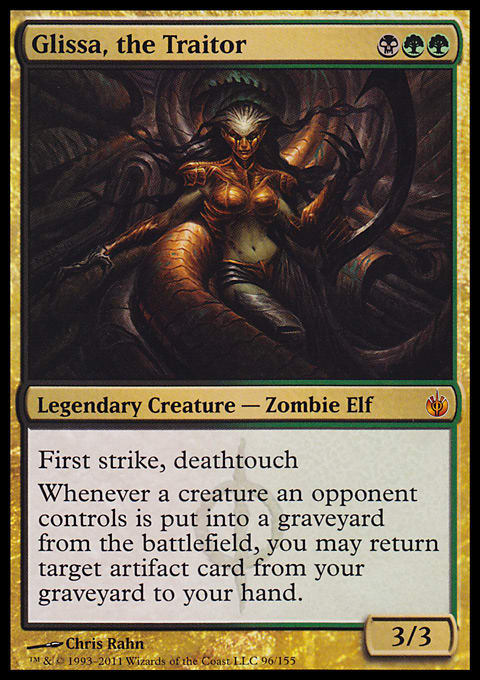So, nothing was banned this time around. Taken from the banned and restricted announcement:
Banning seasons to me feel a lot like Christmas. Christmas works like this: Around November, people start realizing that Santa’s coming, so they start making a big list of things they want. What ends up happening is that people start asking for a lot of things that they haven’t earned.
For example: banning Show and Tell or even, God forbid, Griselbrand in Legacy. There isn’t enough data, there isn’t enough outright dominance of Griselbrand in Legacy yet to justify the stupid #Griselbanned hash tags.
But Santa doesn’t come around to take care of things that often, so when he comes, we want him to take care of whatever’s annoying us at that very moment.
We know better. We know that’s not how Santa rolls.
Santa’s a big-picture thinker, and if it ain’t broke, Santa won’t fix it. So despite everyone clamoring for bannings, Santa didn’t pull the trigger because Santa’s protecting us from ourselves.
You see, we’re not game designers. We don’t know how to fix games. We think we do; we think we can look at a format and say, “HEY. This, that, and the other are all TERRIBLE. C’MON, SANTA, DO SOMETHING.” We’re not patient people. But Santa is, and he’s willing to let Legacy work itself out instead of banning cards willy-nilly at the whims of all the Whos down in Whoville.
That being said, I still think Snapcaster Mage should’ve gotten the banhammer. That card is obnoxious, and it’s going to prove itself way too powerful for Standard for the next year or so.
On the other side of the coin, I don’t know shit.
You ever watch the movie Word Wars? It’s a documentary—on Netflix right now—that deals with tournament Scrabble, following four tournament players of varying ages and backgrounds, all of whom have eschewed normal day jobs in order to be able to pursue Scrabble tournaments full time. There’s Marlon, the tilt-prone young buck from inner-city Baltimore; Matt Graham, the supplement-mainlining former Late Night with Conan O’Brien writer; Joe Edley, the Tai-Chi-ing, middle-aged, number-one ranked player; and last, “G.I.” Joel Sherman. The “G.I.” stands for “gastro-intestinal,” because he’s got one of those gastro-intestinal thingies where the gas from his stomach ends up eating his esophagus.
The first surreal moment of many surreal moments was when Matt and Joel played a heads-up, best-of-fifty match of Scrabble for $1,000 at Joel’s house. Eight hours into the marathon, Matt started complaining about how badly he was being “outpulled,” and he offered Joel $500 in exchange for stopping the marathon. Joel took the $500.
The term “outpulled,” in particular, sounded a lot like the Scrabble parlance for “mana screw.”
I watched the movie with my girlfriend Emily. While watching, I gasped a lot. She had no idea why.
The movie unintentionally shows a lot of interesting parallels between Scrabble and Magic. Word Wars doesn’t clearly illustrate the ins and outs of tournament Scrabble, but from what I could gather, the tournaments work a lot like professional Magic play, but in the professional Scrabble circuit, there’s only one Pro Tour a year, but it’s four days long with no cut to Top 8, and the winner receives $25,000. There are quasi-Grands Prix, but their prizes are even worse than Magic Grands Prix, with still no cuts to Top 8.
“I’d hate to be playing for such small prizes,” I said to Emily.
I didn’t really think about it; the investment we make to play Magic in the first place is a steep one, so it makes sense that even though both professional circuits are sponsored by Hasbro, the one that requires you to keep putting money in it should clearly be the one with the bigger prize support.
All four men profiled in Word Wars are the prototypical grinders. It’s worth noting that they all skew older than Magic players; Marlon is the youngest player of the four guys profiled, and he’s probably in his late twenties or early thirties.
And here’s the part where we venture into bias land.
It is my opinion that Scrabble is less of a social game and more just a game by the numbers; there’s considerably less room to read your opponent, so good social habits aren’t rewarded nearly as much in Magic. What I’m getting at is that at the highest levels of Magic, most pros would fit in anywhere; they’re normal people who dress normally and pursue normal things outside of Magic.
The men profiled in Word Wars are far departures from normal—whatever that is.
G.I. Joel drinks a lot of chalky drinks, thanks to his condition, and inexplicably employs suspenders. Joe Edley willingly performs tai chi in the middle of whatever convention hall the Scrabble tournament’s in.
One of the more shocking things that happened in the documentary was a match between Marlon and Joel. Marlon skipped a turn to repick his letters, and he then pulled the exact same letters. He proceeded to have an emotional breakdown, left in the middle of the match, and went back to his room to smoke a blunt. At that point, I felt it necessary to tell Emily that that’s not allowed at Magic tournaments.
There are a lot of parallels to draw between Magic and Scrabble, but the important difference, and the one for which I’m most grateful, though, is that Magic, for better or worse, generally rewards positive social interaction with your opponent. I’ve written about it before, but the people at the top of Magic are generally well-adjusted people who are pleasant to hang out with. The other guys you see, whether they’re smelling like a dumpster fire at PTQs or just being dismissive of everyone around them, are usually just terrible at Magic.
I have nothing to support this but anecdotal evidence. I do know that when I kept saying aloud about how similar tournament Scrabble and Magic are, the look on Emily’s face politely said “That’s what you do on those weekends you leave?”
Former GatheringMagic writer and current patriot Michael F. Linneman sent me the following decklist to play last week, and it was awesome:
"B/G/W Paladin Rock"
- Creatures (13)
- 2 Nightshade Peddler
- 4 Puresteel Paladin
- 1 Phyrexian Metamorph
- 3 Porcelain Legionnaire
- 1 Thrun, the Last Troll
- 2 Glissa, the Traitor
- Planeswalkers (3)
- 3 Garruk Relentless
- Spells (22)
- 1 Green Sun's Zenith
- 4 Lingering Souls
- 2 Oblivion Ring
- 1 Batterskull
- 1 Wolfhunter's Quiver
- 2 Blazing Torch
- 3 Sword of Feast and Famine
- 4 Flayer Husk
- 4 Mortarpod
- Lands (23)
- 1 Swamp
- 3 Forest
- 4 Plains
- 1 Cavern of Souls
- 2 Evolving Wilds
- 3 Isolated Chapel
- 3 Razorverge Thicket
- 3 Sunpetal Grove
- 3 Woodland Cemetery
- Sideboard (15)
- 2 Day of Judgment
- 2 Dismember
- 2 Grand Abolisher
- 1 Green Sun's Zenith
- 2 Naturalize
- 2 Nihil Spellbomb
- 2 Ratchet Bomb
- 2 Sylvok Lifestaff
I know it’s 61 cards. Not my fault, ya’ll.
I went 2–3 with this deck, with one of my match wins being a bye in the fifth round. The deck was still a total blast to play.
There’s no set nut draw for this deck, but if there were, it would look something like this:
- A Puresteel Paladin
- A Glissa, the Traitor
- A bunch of artifacts, including a Blazing Torch, perhaps even a Wolfhunter's Quiver
- The lands to play everything
From there, you kill something with Blazing Torch, the Glissa, the Traitor triggers, and the Blazing Torch returns to your hand. From there, you get to replay the Blazing Torch, draw a card off Puresteel Paladin, and just have a kick-ass time.
The deck has other redeeming qualities. So long as your opponent doesn’t have a Gut Shot, bonding a Porcelain Legionnaire with a Nightshade Peddler is a pretty big game. Sure, an opponent without a Gut Shot is rare, but it’s far from an impossible dream. Lingering Souls is a nutty card all by itself, and I’m genuinely curious about how it’ll play post-rotation. Even now, Lingering Souls is definitely on the short list of cards that are being underused.
I’d go over my matches, but if I’m being honest, it’s not really worth it; I won my first round against a newer player playing mono-black Zombies—in games where I just drew perfectly both times—and I lost my next three rounds against fellow Cloud City regulars Gino Vittore (W/U Delver), R.J. Fischer (R/G aggro), and fan favorite Kevin Poncelet (mono-green).
Mulliganing with the deck is hard thanks to the mana being a hair’s length away from train wreck. This is compounded by the fact that, while it looks sweet, it’s still a Puresteel Paladin deck. This means that without a Puresteel Paladin in play, the deck is reduced to a bunch of Flayer Husks and Mortarpods. In other words, the deck is pretty shitty without its hallmark 2/2 in play to generate card advantage and eliminate equip costs.
On a related note, there’s no sillier feeling than equipping the wrong guy while you have a metalcraft-enabled Puresteel Paladin in play. “Move my Mortarpod over here. No, wait; that belongs over here. NO WAITWAITWAITWAITWAIT. Moving it here. Okay, that’s good. NO WAIT.”
Good times.
Another common woe of the Puresteel Paladin deck is that the decklist is generally very tight, which basically means that sideboarding is tough, thanks to the fact that it inherently dilutes your strategy and turns you into a completely different deck.
When you switch five or more cards in a deck, you cannot operate under the assumption that you are using the same principles with your new deck as you were with your old version. That being said, I’m fairly positive that I sideboarded wrong in every single matchup, and that bums me out because it makes my anecdotes on how to play the deck about as worthless as the box of kitty litter that my cat just tipped over for no other reason other than because he’s an asshole. But don’t let that deter you from playing the deck! It’s fun as hell, and if you’re not worried about trivial pursuits like “winning the tournament,” it’s a great deck to play.
See you next week live from the Garden State, New Jersey, home of broken dreams and the New Jersey Nets. I have to drive down there from Syracuse in a car with no air conditioning, so that should kick ass.
Jon Corpora
Pronounced Ca-pora






























